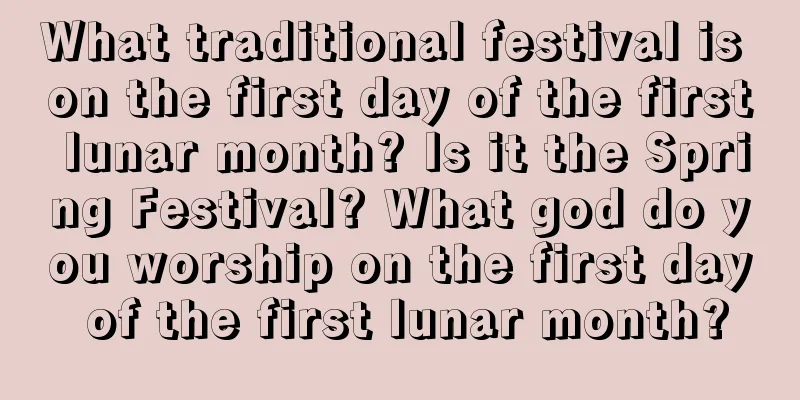Is the sixth day of the sixth lunar month the Washing and Drying Festival? Why do Chinese people wash and dry their clothes?

China has a variety of traditional festivals, many of which have been developed and passed down by people to this day. So is the sixth day of the sixth lunar month the Washing and Drying Festival? Let’s find out together. The Fortune Teller website has carefully compiled detailed information about the sixth lunar month of 2018. If you want to know about the auspiciousness and inauspiciousness of the sixth lunar month, come to Mr. Shui Mo!Is the sixth day of the sixth lunar month the Washing and Drying Festival?"June 6th" was not a day for everyone to wash and dry clothes at the beginning. It was called "Tianfu (kuàng) Festival" in the Song Dynasty. "贶" means "grant, present". According to the "History of Song Dynasty", in the first year of Dazhong Xiangfu (1008) during the reign of Emperor Zhenzong of Northern Song Dynasty, a heavenly book descended twice, on the first month and the sixth day of the sixth month. Zhenzong believed it was a blessing from heaven, so he built the Tianfu Hall in the Dai Temple on Mount Tai. He also announced that June 6, the day when the heavenly book was revealed again, would be the "Tianfu Festival" and designated it as a national statutory holiday. The whole country would have a day off, all officials would burn incense and pray, and private slaughter was prohibited. However, this festival, which was clearly held in the name of God to consolidate imperial rule, was only limited to the Song Dynasty. During the Yuan, Ming and Qing dynasties, the custom of "washing and drying" which was more in line with the seasonal characteristics of this festival was retained and developed.The sun exposure activities on June 6th are very widespread, both above and below the ground. In the imperial palace, the imperial carriage, dragon robes, as well as the palace's archives and documents would be displayed for display; scholarly families would display their collections of books, calligraphy and paintings; pharmacies would display raw and cooked medicinal materials; clothing shops would display appraised clothes; and fur shops would display furs. On the sixth day of June, ordinary families would rummage through their boxes and cupboards, taking out clothes, shoes, hats, beddings, etc. to "show them to the sun". Especially high-end clothes like leather jackets, in order to prevent maggots and moisture, they would be put out in the sun to dry. Those who had stored grain at home would dry it in the courtyard, which was called "exposing the grain to the woodworm." There is no doubt that using sunlight to kill bacteria and insects is a scientific truth, but this kind of "drying your hair" sometimes also has a bit of the meaning of "showing off one's wealth". If one is well-educated or wealthy, one can take this opportunity to show off to his neighbors. Why do Chinese people wash and dry their clothes?June 6th is a festival that is not too difficult to understand. Whether washing or drying, they are both practical and ritualistic health care activities based on the characteristics of the summer climate. The ancient meaning of "bathing" is to wash hair and bathe the body. Considering the strong presence of bathing in traditional Chinese festival rituals - such as the purification bath on March 3, the orchid bath on May 5, and June 6, as well as the bath on the eighth day of the twelfth lunar month recorded in the "Jingchu Sui Shi Ji" - one can't help but ask: In addition to the hygienic purpose of cleansing the body, what other cultural essence does bathing have?"Cleanliness/sanitation" is not the same as "cleanliness". Taiwanese anthropologist Li Yiyuan believes that the distinction lies in: "hygiene" belongs to the technical level, while "cleanliness" belongs to the subjective level. From a technical perspective, body bathing is about eliminating pathogenic organisms and maintaining cleanliness and health; from a subjective perspective, we can see the connotation and extension of the concept of "cleanliness" in a specific culture and society. Generally speaking, the witchcraft/ritual meaning of bathing during traditional Chinese festivals is to "ward off evil" (as well as a series of synonyms and antonyms such as "removing filth", "removing poison", "eliminating sin and miasma", and "purifying misfortune"). "Filth", which is the opposite of "cleanliness", was considered by the ancients to be the source of disasters. Cleansing the body to ward off disasters was the sacred meaning of "cleanliness" during festivals that were special time nodes. A cleansed body acquires the sacredness of "cleanliness", so the matter of cleansing the body is also seen in the rites of life and some other etiquette and rituals. For example, a baby is given a “three-day bath” three days after birth to wash away the filth brought from the “previous life” so that the baby can have peace and good fortune in this life. There is also the bathing of newlyweds at weddings, and the bathing ceremony at funerals to purify the deceased. Or it could be the bathing of ancient Chinese people before "doing big things", such as fasting and bathing before performing a sacrificial ceremony, or bathing before meeting the emperor. There are also special times when bathing is not allowed, such as the mourning period when "one should not bathe for three years." Judging from these customs, we have to regard bathing as a rite of passage, a "threshold" state of transition from one state to another. It is consistent with the temporal transitional nature of festivals or life rituals, and therefore appears frequently in them. |
<<: Is it good for a dog baby born on June 6, 2018? Are you destined to be rich?
>>: What day is the fifth day of the sixth lunar month in 2018? What month and date is it?
Recommend
Is the June 6th Festival in 2018 suitable for marriage? What should I pay attention to when getting married?
Marriage is a major event in life. Many people wil...
Is the day after Frost Descent an auspicious day in 2019? What are the climatic characteristics of Frost Descent?
Introduction: Every day has its good and bad luck....
What day is September 28th in the lunar calendar in 2020? Is it an auspicious day?
What day is September 28th in the lunar calendar ...
What is the date of April 22nd in the lunar calendar in 2021? Is it an auspicious day for praying?
Different days have different auspicious and taboo...
What is the date of the tenth day of the tenth lunar month in 2019? How to judge the luck of the month?
What is the date of the tenth day of the tenth lu...
Do boys born during the Big Snow period in 2018 have good personalities? What’s a good name?
Although everyone cannot choose the time of birth,...
Query the position of the God of Happiness on the 27th day of the fourth lunar month in 2018
The Fortune Teller website has carefully compiled...
Is the second day of the eighth lunar month in 2022 an unlucky day? What is your fortune like?
We often have bad days, and if we blame it on the ...
Which day of the new calendar does the second day of the seventh lunar month in 2019 correspond to, and what constellation is it?
Introduction: Constellations are different from zo...
What are some poems about ancestor worship on Qingming Festival? What does Qingming mean?
Introduction: Qingming Festival is a special day. ...
Check the lunar calendar for April 13th, 2019. Is it a good day?
April is the most beautiful month in the world. A...
Can we pray on the 17th day of the eighth lunar month in 2019? What are the rules for praying?
Can we pray on the 17th day of the eighth lunar mo...
What is the zodiac sign of a baby born on the 16th day of the first lunar month in 2022, and what is his personality like?
The first month of the lunar calendar is the first...
What day is November 18th in the lunar calendar 2018? What month and date is it?
Shui Mo Xiansheng website provides you with more ...
Is October 25th of the lunar calendar 2021 suitable for starting renovations? Is it a good day?
In the tenth month of the lunar calendar, the autu...









